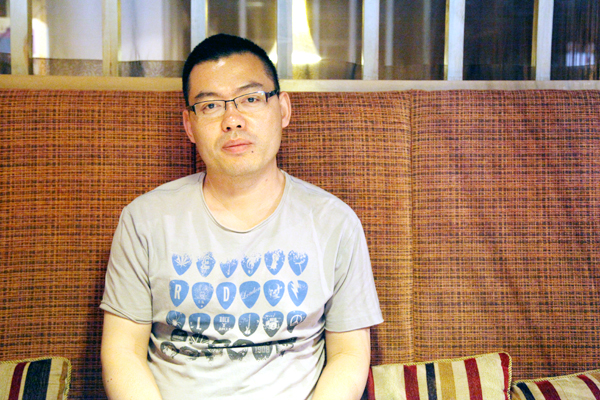

 |
|
[Photo by Fan Zhen/chinadaily.com.cn] |
With his fresh-faced complexion and casual grey t-shirt, Cui Renyu could easily be mistaken for a recent university graduate. In fact, he is 36 years old. And when it comes to music, over a decade working in the industry has taught him much more than any university ever could.
Cui is actually part of the first wave of music magazine founders who introduced Chinese audiences to the world of western music in the early part of the last decade. He also established his own music company, Sounds Great, which has organized more than 300 live shows in China in the past five years. Now, he has combined all of his past experiences to form an indie music festival.
As he passes a newly-printed flyer for his upcoming Dreamer International Music Festival, the organizer shoots a peaceful glance and jokes, "I’ve been ridiculously naive and positive about the music market in China for 13 years. With no car and no house at my age, I guess there is no turning back and I’d better keep going and make my only dream come true."
His dream, as Cui modestly puts it, is to simply, "share good music with others".
Cui studied aircraft manufacturing at Northwestern Polytechnic University in 1996 and soon became bored with humdrum statistics and theories. The late 1990s was a period when recycled CDs and cassettes from abroad thrived in China. When Cui discovered the music of Nirvana, he was immediately hooked by the beautiful lyrics and heart-felt rhythms.
"I felt warmed and moved," he says. "It opened my eyes to a different world that really can inspire you."
Cui’s passion was partly increased by the lack of outlets for experiencing rock music during that time, so he started promoting free live music shows on campus.
Some of his classmates came to the shows but not many, as Cui remembers. Many thought they would not be able to understand the music because the lyrics were not in Chinese.
While believing that good music can arouse feelings that transcend the boundary of language, Cui knew that introducing something foreign to others would require patience and time.
Cui thought, "You cannot force it upon others. You have to influence them." So he decided that having a greater influence would also involve creating a music magazine.
With this faith in music and the power of influence, Cui gave up on taking conventional jobs such as being a civil servant, or becoming a teacher or technician, positions that most of his peers pursued, and started Pocket Music in 2003.
The magazine featuring indie music made a strong debut, selling 6,000 copies of its first issue.
In order to retain the magazine’s independent spirit, Cui did not rely on any advertising, which made it even more difficult for the rookie publisher to survive. "It was not an easy thing to do for an independently published magazine," he said.
However, with a solid team of three in place, consisting of a producer, writer and designer, together they published 17 issues over six years, featuring indie bands and singers at home and abroad.
Chen Qizhen, also known as Cheer Chen, who has since given three stadium concert tours, was just starting out when Pocket Music first introduced her to Chinese music fans by featuring her as the cover story of the magazine’s seventh issue.
Along with other music magazines such as Not Only Music for sleeker, electronic palettes, Xmusic for mainstream pop fans,and I Love Rock N’ Roll for hard and popular rock aficionados,Pocket Music helped create a buoyant music scene by pushing for a wider awareness of music diversity among China’s younger generation of music fans that made up the country’s surging music market.
Things took an unfortunate turn in 2007 when the magazine had to end its publishing run due to a lack of financial support. It was at this point that Cui decided to establish Sounds Great in order to promote good music through live shows.
Keeping close track of popular indie artists on douban.com, one of China’s major social networks for mainland music lovers, Cui has since signed contracts with 34 well-received foreign bands as their agent in China, as well as creating representation relationships with 29 bands from all over the world.